After the defiant U.S. FAA (Federal Aviation Administration) finally suspended indefinitely Boeing 737 Max-8, despite an earlier declaration that there was “no basis to order grounding”, the U.S. Department of Transportation has opened an investigation into the Federal Aviation Administration’s approval of 737 Max planes. Were there irregularities, or even corruption involved in the approval process?
On Oct 29, 2018, a Boeing 737 Max-8 flown by Indonesia’s Lion Air went down into the Java Sea shortly after takeoff, killing all 189 persons. A preliminary report of the Lion Air crash showed that the pilots struggled with the automatic safety system. Five months later, on March 10, the same model of a Boeing plane crashed shortly after takeoff, killing all 157 people on the Ethiopian Airlines plane.
On Sunday, the Ethiopian Minister of Transport revealed that preliminary data recovered from the black boxes showed “similarities” between the two crashes. Apparently, the FAA was being investigated since the Lion Air’s crash. Now, a subpoena has been issued by a grand jury in Washington seeking “documents, including correspondence, emails and other messages”.
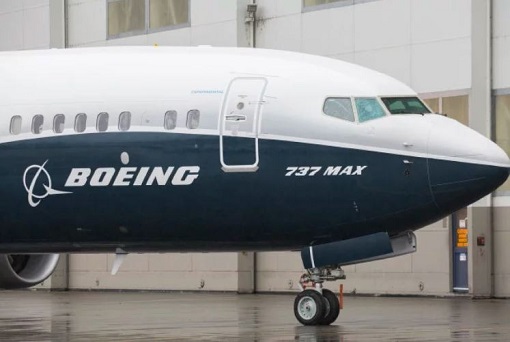
Essentially, this means the Civil Aviation Administration of China (CAAC) was correct to ground the Boeing model immediately after the Ethiopian Airlines crash. The swift decision to ground the 737 Max-8 within 24 hours of the March 10 tragedy, making the Chinese the first to do so, is now being used by China to raise the profile of the country as the new safety-conscious guardian of the skies.
Immediately after the Ethiopian Airlines’ crash, China ordered Chinese airlines to ground all 96 of its 737 MAX-8 models. The CAAC claimed its decision was made due to safety concerns, and not to undermine the American aircraft manufacturer, despite the ongoing trade war and the arrest of Huawei CFO (chief financial officer) Sabrina Meng Wanzhou.
The single-aisle 737 MAX-8, also known as 737-8, is the American plane maker’s challenge to Airbus’s A320 jet and first started flying in 2017. As a huge market for the Boeing 737 MAX 8, Chinese airlines accounted for about 20% of 737 Max deliveries worldwide through January. By January this year, the company had delivered more than 350 of the planes with about 5,000 more are on order.
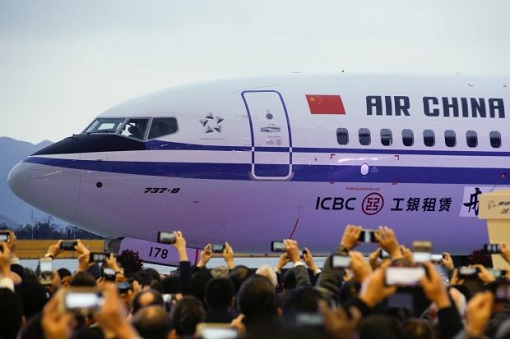
Chinese airlines have ordered at least 104 of the US$120 million a pop 737 Max planes, and have taken delivery of at least 70. After the China’s aviation authority’s decision, airlines around the world followed accordingly. Today, a total of 50 countries, including the European Union, United Kingdom, Australia, New Zealand, India and of course, the U.S., has grounded the planes.
It makes perfect sense that Beijing took the lead to suspend the 737 Max planes from taking off into the skies, even if there was indeed zero element of undermining the United States. As China pushes itself to become one of the world’s superpowers – economically and militarily – the reputation and image of the Middle Kingdom is always being compared to that of the U.S.
The flip-flopping of the FAA in grounding the Boeing’s fastest selling model had given the Civil Aviation Administration of China the chance to score an important point in the international court of public opinion. It has been the goal of Beijing from the beginning to narrow the gap between the China’s aviation authority and the Federal Aviation Administration (FAA) and European Union Aviation Safety Agency.
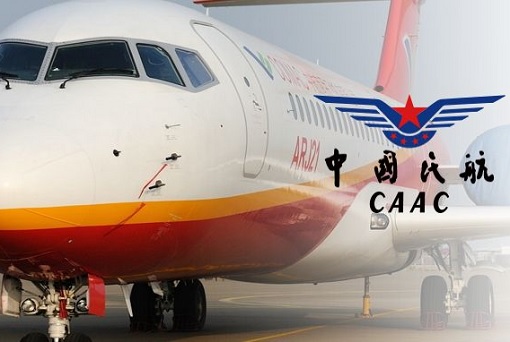
Shen Dingli, a professor of US studies at Fudan University in Shanghai, said it showed the world that China was keener than the United States in ensuring absolute safety. He said – “China did this purely for aviation safety and for its own people … even if China had not been the first to ground the aircraft, other countries would have done the same, including the US.”
Hence, the Chinese decision was wise, even if there was nothing seriously wrong with the Boeing 737 Max models. Li Jian, a deputy head of CAAC, said after the Ethiopian crash Beijing had reached out to Boeing and the FAA. However, both parties “could not make up their minds” whether to ground the aircraft or otherwise – forcing China to move ahead on its own.
It’s not hard to understand why Beijing is happily blowing its trumpet now. Its own aircraft manufacturing industry needs a boost, no matter how small, to position the nation’s first long-haul airliner – the Comac C919. The state-owned Commercial Aircraft Corp. of China (Comac) says its C919, which has more than 800 orders worldwide, competes directly with the Boeing 737 Max-8.
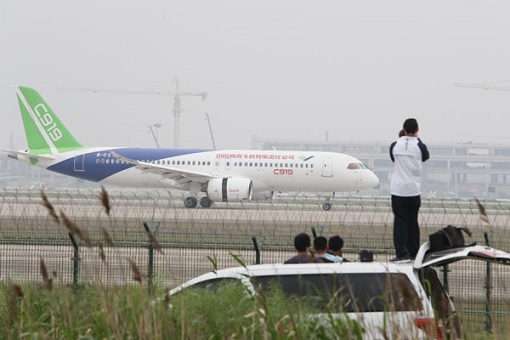
The C919 was a result of President Xi Jinping’s ambitious plan to build an aerospace industry from the scratch. The aircraft from China is supposed to provide an alternative, presumably cheaper, besides major players American Boeing and European Airbus. But Beijing’s aspirations extend beyond the narrow-body twinjet airliner, which can carry 168 passengers.
Comac is working with Moscow-based United Aircraft Corp. to develop the long-range, 250-to-320-seat wide-body CR929 that could eventually fly long-haul routes such as Beijing to New York, and gives both Boeing and Airbus a run for their money. Shanghai-based Comac said last November that China’s aviation market will take delivery of 9,000 planes – worth US$1.3 trillion – over the next two decades.
But there’s one huge problem with the Chinese commercial planes. They don’t have the safety track record that Western possesses. More importantly, no Chinese company has the capacity to design and produce engines for commercial jets. The C919’s engines are made by CFM International, a joint venture of General Electric Co.and France’s Safran SA.
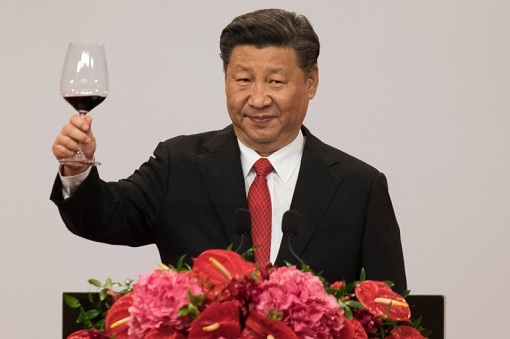
Clearly, the Ethiopian Airlines crash has provided President Xi, and China’s aerospace industry for that matter, an opportunity to market Made-in-China planes. Still, the aggressive reaction to the 737 Max problems will not be enough to convince foreign airlines that the Chinese planes are on par, let alone better, than the Boeing.
Sure, China has shown to the world its “zero tolerance” of aircraft safety. It may or may not help China sell more C919. After all, Boeing 737s have been the reliable industry workhorses for decades, while China’s Comac jets have only recently begun to fly. The C919, more than 95% sold to Chinese airlines, is still years away from being able to give a meaningful threat to Boeing.
Other Articles That May Interest You …
- FAA Protecting Boeing? – Despite Assurance, Airlines Around The World Suspend Boeing MAX-8 Jets
- Boeing In Trouble – Stock Sinks In Worst Fall Since 2001 After Best Selling 737 MAX-8 Jet Crash
- Huawei Strikes Back – U.S. Fears Of Being Left Behind, Fails To Hack Into Huawei To Spy
- This Profession Will See A Massive Demand – 800,000 Jobs – In Asia Over The Next 20 Years
- Top-5 Simple Secrets That Make Singapore Changi The World’s Best Airport
- Meet SEA First Self-Made Woman Billionaire – Queen Of “Bikini” VietJet
- Secrets Revealed – TIPS To Get A Free First Class Flight Upgrade
- Here’re 20 Dirty Secrets The Airlines Don’t Want You To Know
- Top-15 Best & Luxurious First Class Amenity Kits From Airlines Around The World
- Secret Revealed – The Secret Chambers Where Pilot & Cabin Crew Rest & Sleep (Photos)

|
|
March 18th, 2019 by financetwitter
|


|

|

|

|

|

|
Comments
There is no indication China is out to challenge Boeing at any time. Nor is there any certainty that Yank domination of the aerospace industries is here to stay forever.
So long as China does not have smug kampong-minded wonders with dubious “university” degrees smoking the funny stuff from huge imaginary hemp plantations where ganja is yet to be planted, and designing imaginary flying cars, China will, in fact, quite steadily make very decent stride in technology and science.
In fact, China has.
And in some areas, China has outdone the West.
All while our plantation niggah servile stooges continuously butt-shafted by the West (and grateful) make their bomoh predictions about China, China has being making tremendous advances we will never do in a long time from now – or ever!
The Chinese cry of “Made in China” has sent shivers down the collapsing spine of the US of A.
Fancy Malaysia making the same declaration…
We have failed, and failed miserably making our almost very-own car. Our venture into the car-building industry was a downright eternal disaster!
Our new disaster is the very thought of returning to build our own cars again! It’s all a mighty pipe dream – drainpipe! Unless building another national car is for the purpose of milking our national funds (you can be very rich from that – but not the country!), we should not entertain our big dreams!
And we should keep the thought of a flying car in those huge imaginary ganja plantations too. Keep puffing at the imaginary hemp, it is safest for us, and definitely for our own good, cooking up wild dreams – and serving it with extra hot sambal (or Sambo?) sauce.
We will never be in China’s league, we best sit back or, better still, lie back under our oil palm trees in drunken stupour and dream of flying around in our cars and conquering the world.
When our brave and beautiful wake up, it won’t be the West they would be grateful plantation niggahs to, it will be, Yes!, the Chinese!
The Chinese have dreams. But they get off their backsides to achieve them.
We have dreams too. But we end up being good critics, good advice dispensers, and absolutely nothing else but raving hallucinating fascinating plantation Sambos!
Now go pump our plentiful palm oil in your flying cars.
And go back to sleep.




























Civil aviation is an expensive long term game. He who has the most money & willingness to give discounts, wins.
Airbus too was years, nay decades, away from challenging Boeing & the Paris Airshow crash certainly didn’t help. But today, Airbus is a real threat to Boeing.
Foresee CAC to be a real threat within this decade, if the Chinese don’t screw it up.